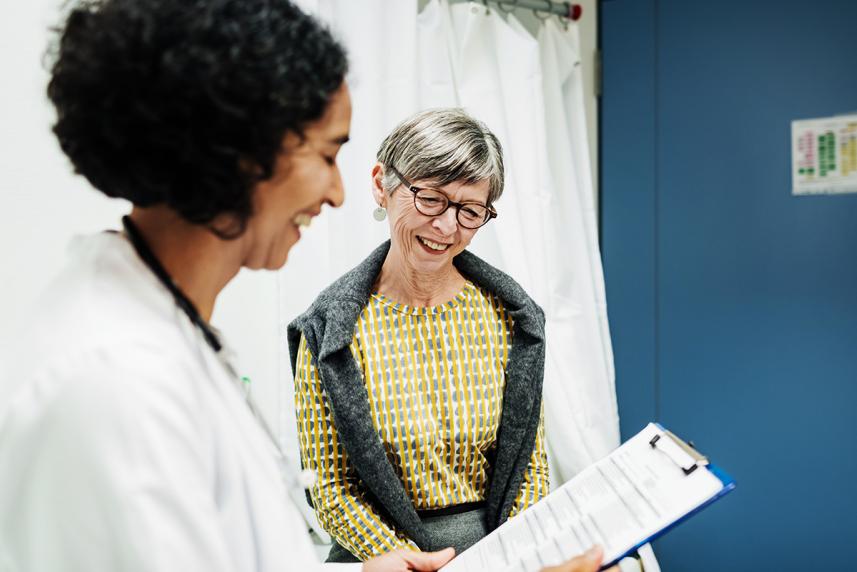
You have access to programs for managing diabetes, cancer, COPD, and more through the Blue KC Care Management app. Get started today with the access code kcwsqcare.
When you’re feeling off, it could be your body trying to tell you something. Don’t let these signs of a heart attack fly under the radar.

You might think that if you ever have a heart attack, you’ll just know it. Like in the movies, you’ll clutch your chest, call 911, and head to the hospital right away. But that’s not always the case — especially if you’re a woman.
Heart disease is the leading killer of women in the United States. It’s the cause of death for one in three women each year, reports the American Heart Association (AHA). The signs and symptoms women have aren’t always obvious. In fact, they might not even be aware that they’re having a heart attack.
Some symptoms of a heart attack include:
“Some heart attacks are sudden and intense. But many times, symptoms begin and then become more pronounced over time,” says Suzanne Steinbaum, D.O. Dr. Steinbaum is a cardiologist in New York City and a volunteer medical expert for the AHA. Women may also brush off their symptoms as acid reflux, the flu, or a sign of normal aging, Dr. Steinbaum says.
It’s important to know exactly what symptoms to watch for. That way, you can jump into action. Taking quick action can help save your heart — and your life. If your symptoms are subtle and you’re on the fence about whether to see a doctor, err on the side of caution. This is definitely a time where it’s better to be safe than sorry.
This is the most common symptom people report. More than 85% of people have chest pain when having a heart attack, according to findings in the journal Circulation. It can feel like uncomfortable pressure, tightness, or pain that lasts more than a few minutes. It can hit fast or come on slowly.
“Many patients say their chest pain feels more like pressure than pain. It has been described as feeling like an elephant sitting on your chest,” says Dr. Steinbaum.
But chest pain isn’t the only telltale sign to watch for. Some women may feel the discomfort lower in their chest than men do. They might even feel pain in the upper part of their stomach. That’s why some mistakenly think it’s acid reflux.
In the Circulation study, women were also more likely to think their chest pain was due to stress or anxiety. Sure, life can be hectic. But chest pain isn’t normal. If you have chest pain, call 911.

You have access to programs for managing diabetes, cancer, COPD, and more through the Blue KC Care Management app. Get started today with the access code kcwsqcare.
It’s one thing to feel out of breath if you’re running. But do you find yourself gasping for air while walking up the stairs or taking a walk? Pay attention if you used to do routine things like these easily but now find yourself winded. Shortness of breath can be a sign of a heart attack. “Exercise not only is by far the best medicine — it’s the barometer for knowing exactly how you feel,” says Dr. Steinbaum.
There are a lot of clear reasons for feeling queasy: Motion sickness, a stomach bug, food poisoning. But nausea or vomiting can also point to a heart attack. “Women may dismiss these types of symptoms, as they can be caused by issues not linked to a heart attack,” says Dr. Steinbaum.
Not sure why you’re vomiting or struck with a bout of nausea? Get in touch with your healthcare team right away. As Dr. Steinbaum says, “Don’t die of doubt.”
Fatigue is so common that many of us don’t give it a second thought. Long workdays, too little sleep, skipping meals — the list of everyday reasons for an energy crash is long.
The red flag? When your tiredness seems out of line with what you’ve felt in the past, says Leslie Cho, MD. Dr. Cho is a member of the American College of Cardiology’s Cardiovascular Disease in Women Committee in Cleveland.
For instance, maybe you often feel low energy around 3 p.m., but drinking water or eating a snack perks you up. But if you suddenly feel so exhausted you must lie down, your body — and possibly your heart — may be trying to tell you something.
Pain from a heart attack can travel to other parts of your body, such as down your arms or into your back, jaw, or neck. This can also feel like pressure. You may also feel this in your chest, which differs from the scenario of a lightning-bolt pain.
It’s telling if your symptoms happen when you’re up and moving and then get better when you stop. That tends to point the finger toward a heart problem.
Yes, some people show no signs that they’re having a heart attack. This is called “silent ischemia,” says Dr. Cho. In this case, people usually find out they had a silent heart attack while taking a test at a doctor’s office. Tests include an electrocardiogram, echocardiogram, or stress test. They show when the heart isn’t getting enough blood.
Who is most at risk for having a heart attack with no symptoms? People who have diabetes (especially younger women) and people who have had a previous heart attack have a higher chance of having another one.
“Most women will have a heart attack 10 years later than men. But women who have diabetes often have heart attacks at a similar age as men,” Dr. Cho says.
If you have diabetes or have had a heart attack before, you should talk to your doctor. The good news? Preventive screenings and changing some of your habits can help lower your chances of having silent heart attacks.
It is good to be aware of the signs of a heart attack — and to know that you may have more than one symptom at once. In the Circulation study, women were more likely to have three or more symptoms at the same time. But know that it’s not up to you to decide if you’re having a heart attack.
“If something doesn’t feel right, it’s worse than you’ve ever felt, or it’s something you’ve never experienced before, you need to seek professional help,” says Dr. Cho. “Don’t be your own doctor. That’s what your healthcare team is for.”
Additional sources:
Women and heart disease: The American Heart Association
Heart disease awareness: Cleveland Clinic
Sex differences: Circulation